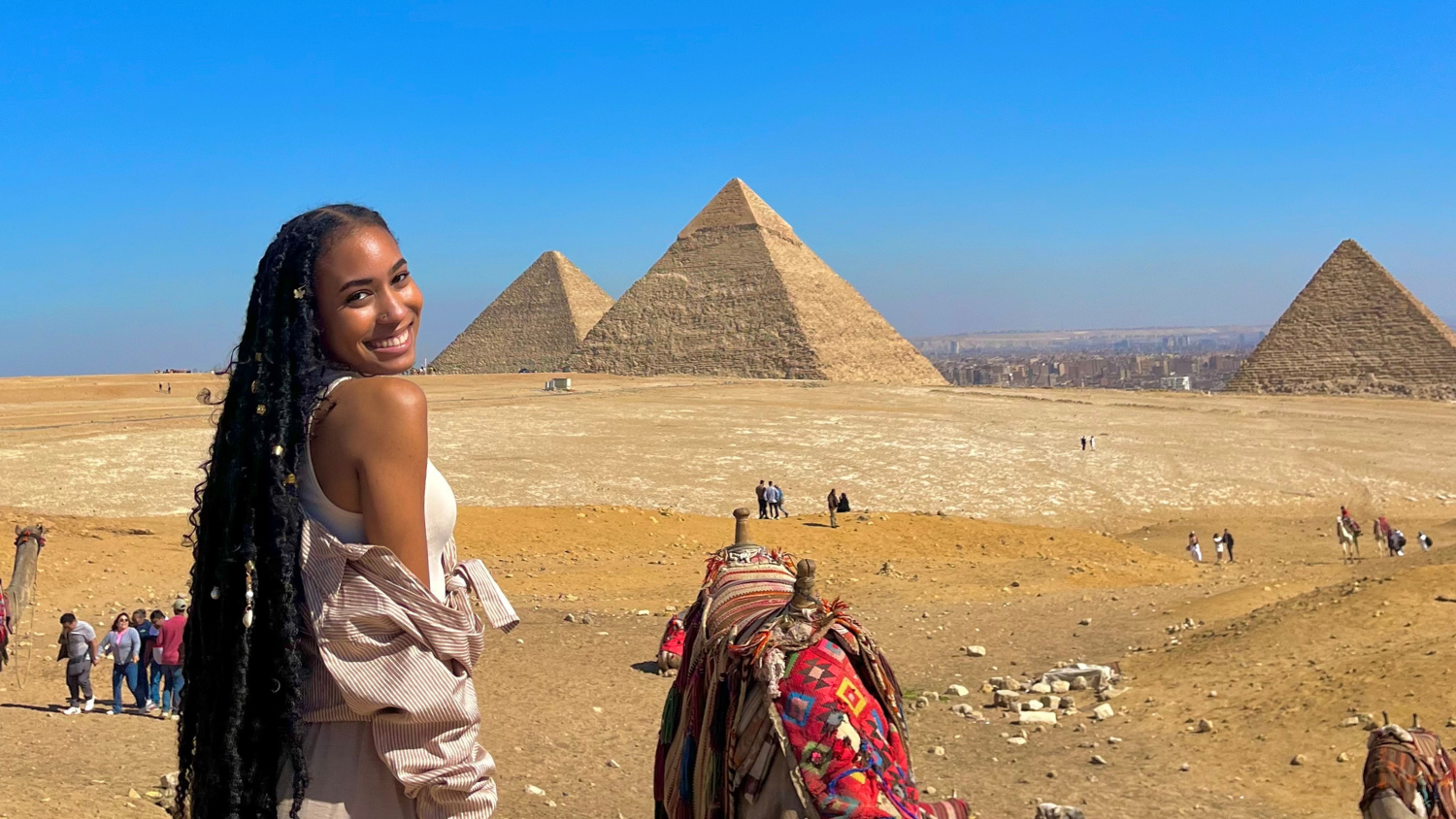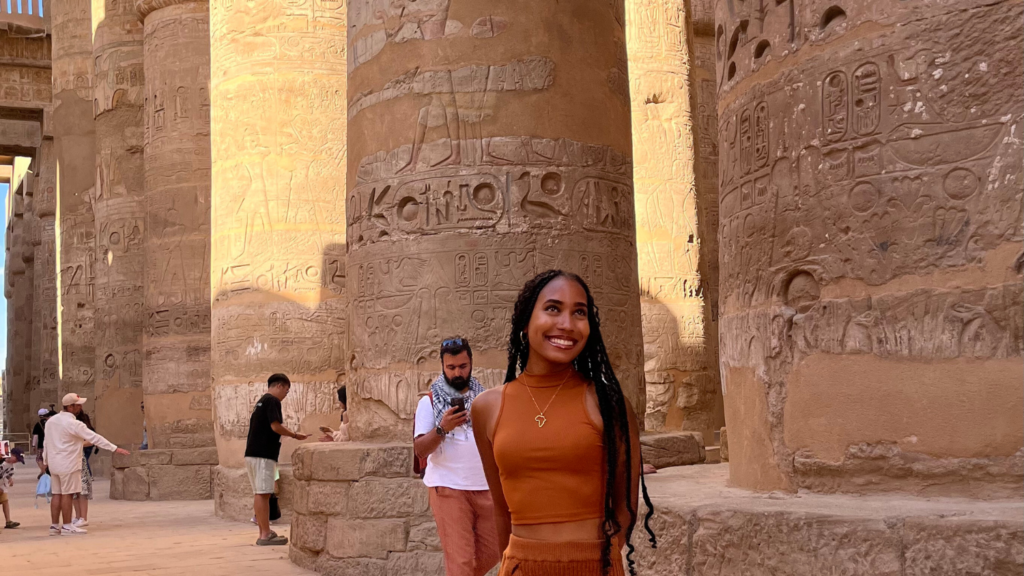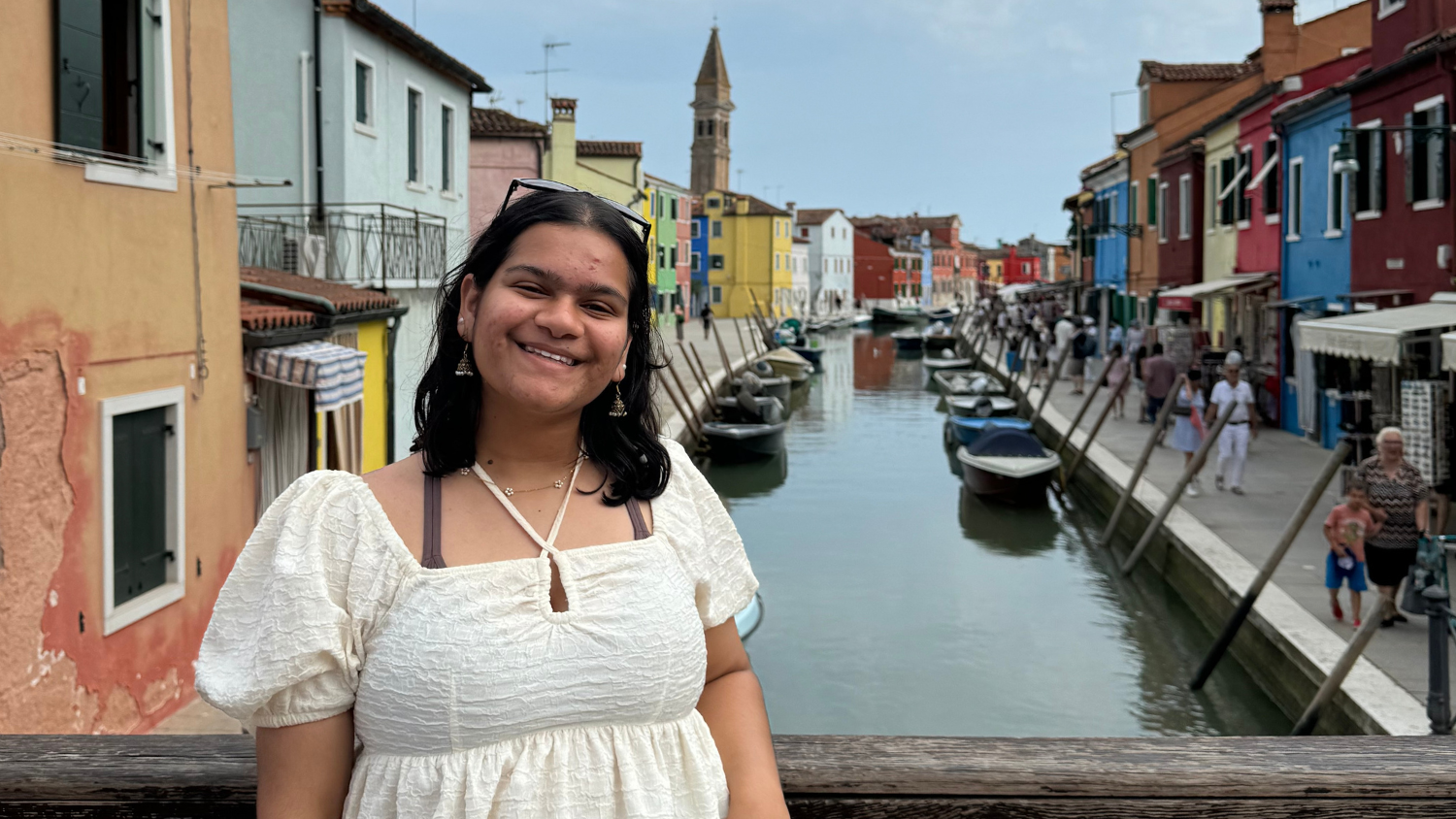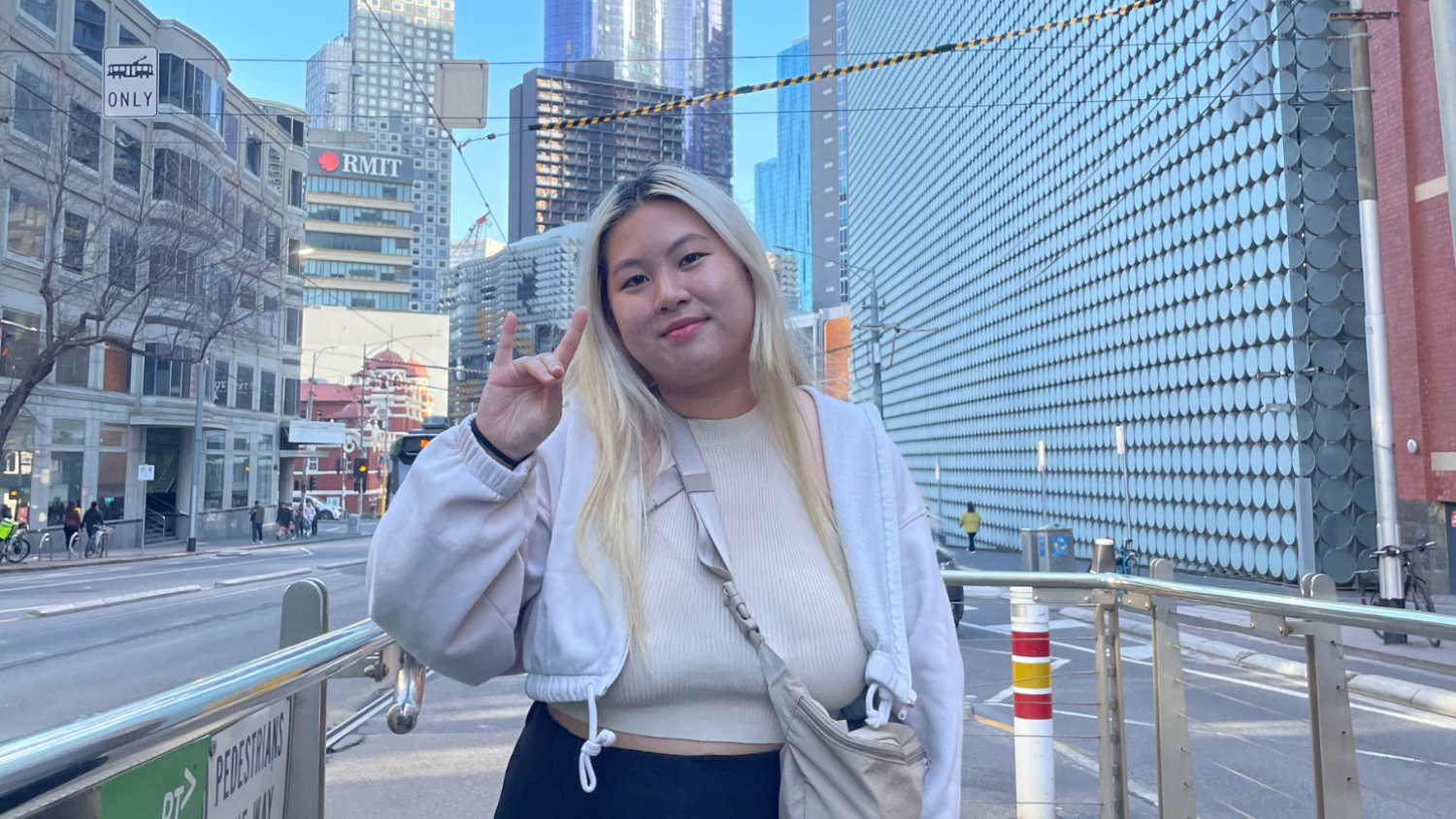Meet Adachi Amaram (she/her)

Program and Location:
Spring, American University in Cairo; Cairo, Egypt
Major/Minor:
Political Science Major, History Minor
Why did you choose to study abroad?
Growing up in an immigrant family, I’ve been fortunate to be exposed to a diverse range of worldviews and perspectives. My family’s experiences and stories have painted a vivid picture of the world beyond my immediate surroundings. This exposure has fueled my curiosity and passion for understanding different cultures and global issues. However, this exposure alone is insufficient to transcend these insights into my academic training. My desire to study abroad was driven by a motivation to expand my academic horizons and gain unique perspectives that would shape my future in global politics, and educate me on best practices to protect human rights especially in Arab and African nations. My deep commitment to studying these topics, and my academic pursuits are inherently connected to advocating for the rights and well-being of vulnerable communities worldwide. My family’s history, as survivors of a genocide, has instilled in me a strong sense of responsibility to contribute to the prevention of such atrocities and the protection of human rights.
However, there remained a missing piece in my quest to comprehend these atrocities: reconnecting with my ancestral roots in Africa. As a second-generation African woman who had never been to the continent, I felt a need to visit places of historical significance, examine ancient artifacts and civilizations firsthand, and study primary sources that I had limited access to in the U.S. I yearned to engage with African and Arab experts who could provide insight into historical events that have greatly impacted the continent and the African diaspora. Studying in Egypt fulfilled this aspiration. Egypt’s rich history, culture, and civilization dating millennia beckoned me. It served as a gateway to Africa, granting a unique perspective on the continent’s past and contemporary challenges. Exploring Cairo’s ancient wonders, visiting archaeological sites, and conversing with historians immersed me in Egyptian, Arab, and African history and culture. My choice to study abroad in Egypt was driven by a profound desire to connect stories of my family’s past and my academic and advocacy pursuits. It promised self-discovery, cultural enlightenment, and historical context crucial to my contributions to international affairs.
What did you learn about yourself?
Throughout the semester I gained a greater understanding of Western involvement in the Middle East and North Africa, learned how to identify and read certain hieroglyphs, and developed a beginner’s proficiency in the Modern Standard and Egyptian dialects of Arabic. While the courses proved to be some of the most challenging curriculum I had undertaken in my undergraduate career, the payoff and intellectual stimulation was well worth it. These courses transformed my understanding of the international world stage and the colossal role colonialism played in international law. My ideas of the foundations of early religions were challenged and my eyes were opened to the interconnectedness of early religions, particularly the Abrahamic religions. My concept of language was reshaped, my American syllables were broken and remolded, my idea of a “verb” was revolutionized.

What was one of your favorite parts of your program?
Cosplaying as Indiana Jones made up some of my favorite memories in Egypt. I was convinced I was in Raiders of the Lost Ark as I crawled under the pyramids of Giza and Saqqara, interpreted the hieroglyphs in the magnificent tombs in the Valley of the Kings, and listened to the stories of the ancients in the temples of Luxor and Karnak. After climbing for what felt like forty days and forty nights (it was five hours), I channeled my inner Moses as I watched the birth of the sun atop the infamous Mt. Sinai. Throughout my journey, I felt more in touch with nature than ever before. As I lay on a sand dune in the Fayoum Desert, one of Egypt’s most famous star-gazing sites, I felt I could join Orion’s hunt and dance with Cassiopeia. From racing through the desert night on horseback, caressing the newborn kittens on AUC’s campus, to taking midday strolls through AUC’s beautiful garden, I felt in tune with the land in a way I never had before.
While everything mentioned thus far was magnificent, nothing compares to the people I met. The people in Egypt were some of the kindest people I had ever encountered. Whether it be the North, South, East, or West of the country, the people treated me like family. From my Egyptian friends at AUC who practiced Arabic with me, to the Sudanese refugees who braided my hair, and everyone in-between, I felt loved and seen. I didn’t worry about my skin color, my tone of voice, or having to prove my African heritage. In Egypt I didn’t feel like Adachi the Black girl, I was finally just able to be Adachi.
What advice do you have to future study abroad students?
Be open to every opportunity that presents itself to you (within reason of course). Studying abroad is a time to break out of your comfort zone and immerse yourself in a different culture. A high bandwidth for flexibility and cultural tolerance is necessary for this experience, especially when studying in an environment unfamiliar to you. During your time abroad, it is important to befriend people from a diverse set of backgrounds. A disservice would be done if you intentionally stuck in homogenous circles of study abroad students from the United States. Take advantage of the opportunity to explore. Do you due diligence in your classes (again, within reason), but also make the most of your time abroad by planning trips around the territory you’re in and even to other neighboring locations. Be proactive and research historical landmarks and places of interest beforehand so you can prepare a rough itinerary upon arrival. With that being said, don’t get caught up in following everything exactly to plan. One of the beauties of studying abroad is the journey itself, it’s the moments when the trip goes off the rails but you have a new story to tell, the new people you unexpectedly meet along the journey, the growth and adaptability you see within yourself from those experiences. Take everything in, and be grateful for every day you experience.
How were your classes abroad different than if you would have taken them at NC State? Did you take any field trips or do anything outside of the traditional classroom?
Throughout the semester I gained a greater understanding of Western involvement in the Middle East and North Africa, learned how to identify and read certain hieroglyphs during field trips to historically rich sites, and developed a beginner’s proficiency in the Modern Standard and Egyptian dialects of Arabic. While the courses proved to be some of the most challenging curriculum I had undertaken in my undergraduate career, the payoff and intellectual stimulation was well worth it. These courses transformed my understanding of the international world stage and the colossal role colonialism played in international law. My ideas of the foundations of early religions were challenged and my eyes were opened to the interconnectedness of early religions, particularly the Abrahamic religions. My concept of language was reshaped, my American syllables were broken and remolded, my idea of a “verb” was revolutionized.

In what ways did your identity have an impact on your experience abroad?
I was treated really well in Egypt and sometimes even better when people realized I was African or assumed I was Egyptian. Like I mentioned earlier, I was treated like family amongst most Egyptians and other Africans in the region. I actually experienced the most amount of racism from my study abroad peers, particularly from American students. This was unfortunate however, unsurprising, and I found solace in hanging more with my Egyptian and African friends or other students of color to avoid some of the negative experiences I was enduring in the company of American, typically Caucasian students. It is important to note that my experience is unique to me. While I had a largely positive experience as a Black/African woman in Egypt, some of the other international students from African countries had different experiences. Many experiences colorism from other Egyptians as well as micro aggressive comments or questioning from AUC students. Due to a diverse set of phenotypes and ethnic backgrounds in Egypt, I observed that racism looked very different from what we commonly coin as racism in the U.S., and most prejudice is manifested through colorism and classism which of course are all interconnected.
Would you do it again?
I would absolutely do it again. Studying abroad strengthened so many skills I knew I could have in theory, and it allowed me to see them prosper in real-time. Due to this experience I have blossomed into more of a risk-taker, and the ability to think on my feet has grown exponentially. If it weren’t for study abroad I would not value the tranquility of nature as much as I do now. I also would not seek a career where continuous immersion into different cultures will be necessary for the rest of my life. I would embark upon this journey 100 times over.


